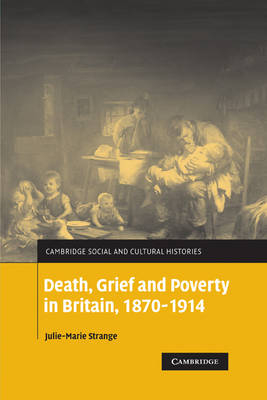
Death, Grief and Poverty in Britain, 1870–1914
Seiten
2010
Cambridge University Press (Verlag)
978-0-521-16862-5 (ISBN)
Cambridge University Press (Verlag)
978-0-521-16862-5 (ISBN)
Julie-Marie Strange studies the expression of grief among the working class in Victorian and Edwardian Britain, demonstrating that poverty increased - rather than deadened - it. She illustrates the mourning practices of the working classes through chapters addressing care of the corpse, the funeral, the cemetery, and commemoration.
With high mortality rates, it has been assumed that the poor in Victorian and Edwardian Britain did not mourn their dead. Contesting this approach, Julie-Marie Strange studies the expression of grief among the working class, demonstrating that poverty increased - rather than deadened - it. She illustrates the mourning practices of the working classes through chapters addressing care of the corpse, the funeral, the cemetery, commemoration, and high infant mortality rates. The book draws on a broad range of sources to analyse the feelings and behaviours of the labouring poor, using not only personal testimony but also fiction, journalism, and official reports. It concludes that poor people did not only use spoken or written words to express their grief, but also complex symbols, actions and, significantly, silence. This book will be an invaluable contribution to an important and neglected area of social and cultural history.
With high mortality rates, it has been assumed that the poor in Victorian and Edwardian Britain did not mourn their dead. Contesting this approach, Julie-Marie Strange studies the expression of grief among the working class, demonstrating that poverty increased - rather than deadened - it. She illustrates the mourning practices of the working classes through chapters addressing care of the corpse, the funeral, the cemetery, commemoration, and high infant mortality rates. The book draws on a broad range of sources to analyse the feelings and behaviours of the labouring poor, using not only personal testimony but also fiction, journalism, and official reports. It concludes that poor people did not only use spoken or written words to express their grief, but also complex symbols, actions and, significantly, silence. This book will be an invaluable contribution to an important and neglected area of social and cultural history.
Julie-Marie Strange is Lecturer in Modern British History at the University of Manchester.
Acknowledgements; List of abbreviations; 1. Introduction: revisiting the Victorian and Edwardian celebration of death; 2. Life, sickness and death; 3. Caring for the corpse; 4. The funeral; 5. Only a pauper whom nobody owns: reassessing the pauper burial; 6. Remembering the dead: the cemetery as a landscape for grief; 7. Loss, memory and the management of feeling; 8. Grieving for dead children; 9. Epilogue: death, grief and the Great War; Bibliography; Index.
| Erscheint lt. Verlag | 9.9.2010 |
|---|---|
| Reihe/Serie | Cambridge Social and Cultural Histories |
| Zusatzinfo | Worked examples or Exercises |
| Verlagsort | Cambridge |
| Sprache | englisch |
| Maße | 152 x 229 mm |
| Gewicht | 450 g |
| Themenwelt | Geschichte ► Allgemeine Geschichte ► Neuzeit (bis 1918) |
| Geisteswissenschaften ► Geschichte ► Regional- / Ländergeschichte | |
| Geschichte ► Teilgebiete der Geschichte ► Kulturgeschichte | |
| Geschichte ► Teilgebiete der Geschichte ► Sozialgeschichte | |
| Sozialwissenschaften ► Soziologie ► Mikrosoziologie | |
| ISBN-10 | 0-521-16862-7 / 0521168627 |
| ISBN-13 | 978-0-521-16862-5 / 9780521168625 |
| Zustand | Neuware |
| Haben Sie eine Frage zum Produkt? |
Mehr entdecken
aus dem Bereich
aus dem Bereich
Europa 1848/49 und der Kampf für eine neue Welt
Buch | Hardcover (2023)
DVA (Verlag)
48,00 €
Giordano Bruno - ein ketzerisches Leben
Buch | Hardcover (2024)
C.H.Beck (Verlag)
29,90 €


